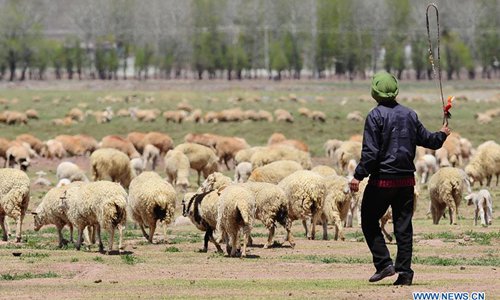Global poverty solved thanks to China, not 2019 Nobel economics laureates

A herdsman grazes on a family farm at Jurong Village of Ganqu Town in Lhunzhub County of Lhasa, capital of southwest China's Tibet Autonomous Region, May 7, 2013. China's plateau city Lhasa announced on Jan. 7, 2019 that the last remaining 44,000 people were taken off the poverty list last year, signaling a victory in the campaign against destitution. A total of 44,439 people lived below the poverty line, defined as per capita annual income of 2,300 yuan (around 335 U.S. dollars) at 2010 prices, in Lhasa. Through creating jobs, relocation from less-inhabitable places, education funding and social welfare programs, residents perplexed by poverty now earn much more than they used to, according to local authority. Lhasa is the first to complete its poverty reduction target, leading other cities in Tibet. (Xinhua/Liu Kun)
Maybe it's time to abolish the absurd Nobel Prize for economics. Monday's announcement of this year's Nobel economics laureates points to the absurdity of the prize that technically isn't really a Nobel.Indian-origin economist Abhijit Banerjee, French-American economist Esther Duflo and American development economist Michael Kremer won this year's economics prize "for their experimental approach to alleviating global poverty."
The theoretical contribution made by the three economists to alleviate global poverty pales in comparison with China's massive poverty-alleviating achievements. Since the nation's reform and opening-up began in 1978, China has lifted more than 850 million people out of poverty, according to the World Bank.
China's targeted poverty-reduction efforts have proven much more compelling than this year's Nobel economics choice.
Nonetheless, it turns out that an Indian-origin economist was one of the laureates while India is barely on par with China as measured by the poverty-alleviation push and achievements.
If the economics prize disconnects itself from what the world's second-largest economy has achieved, it's advised that the Nobel Foundation not list the prize on its website. After all, the foundation doesn't choose the winners or fork out the award, rendering it a longtime contentious issue.
The author is a reporter with the Global Times. bizopinion@globaltimes.com.cn